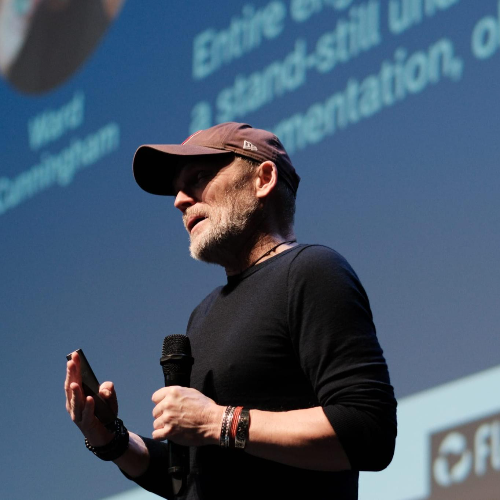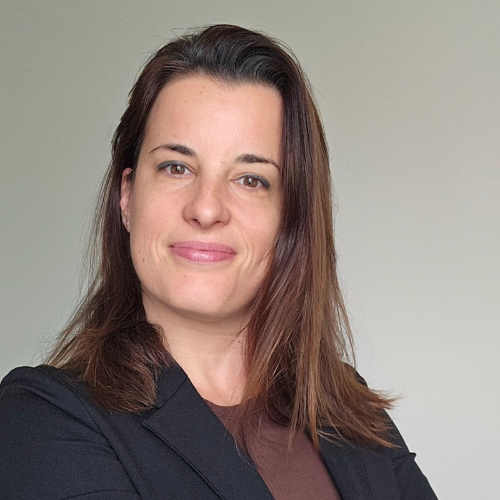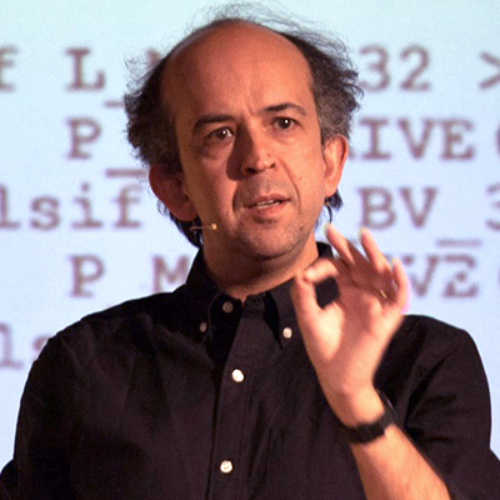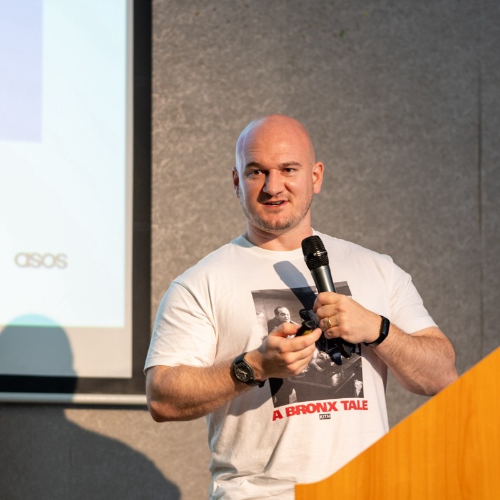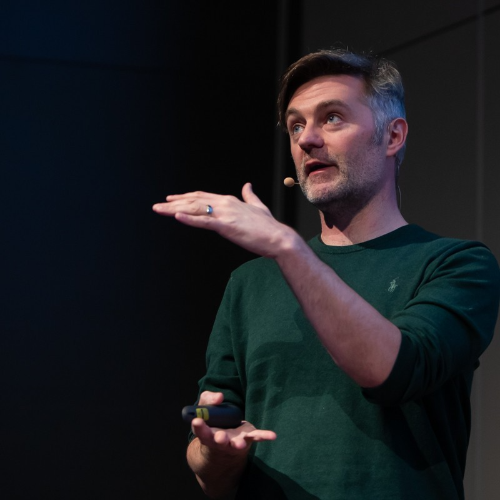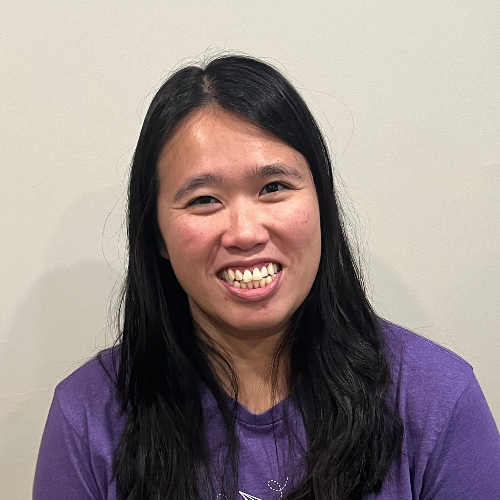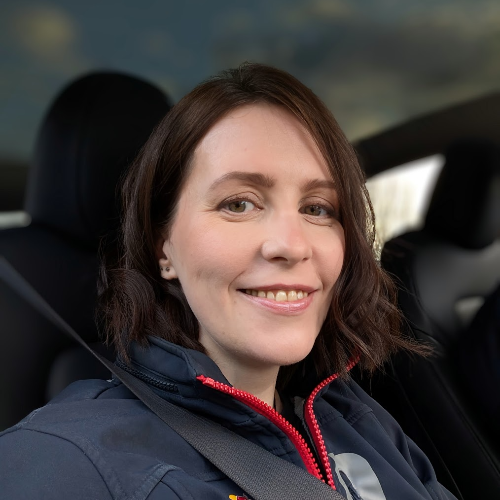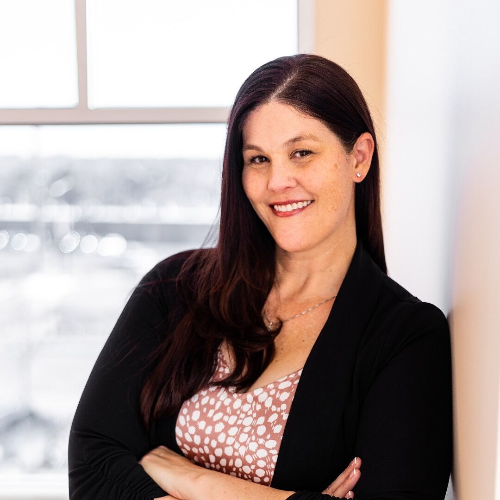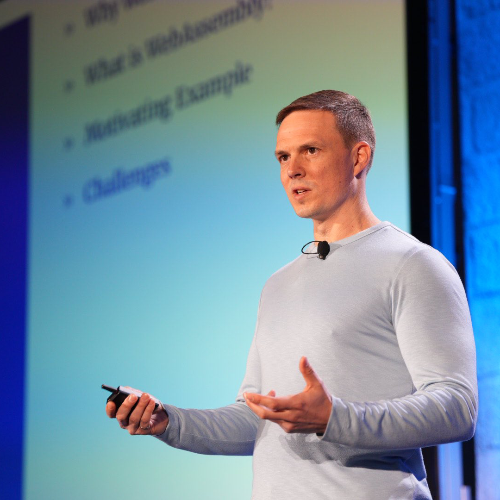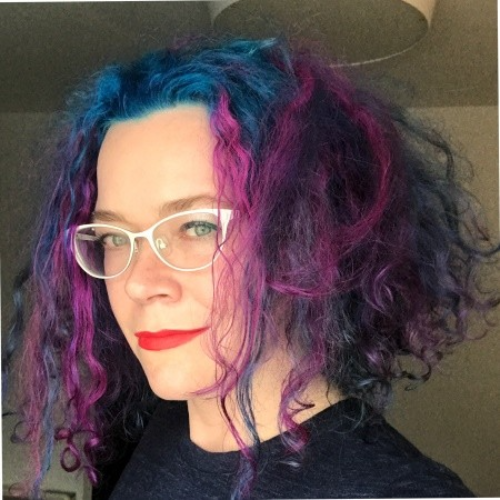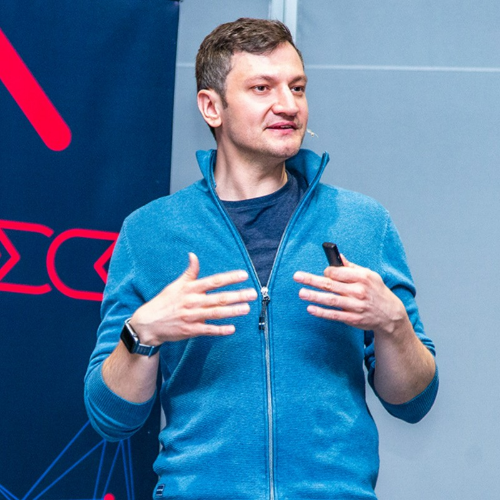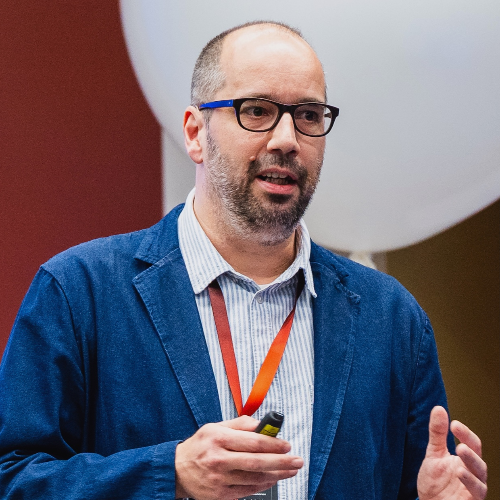Before you invest in AI, do you know where it will actually make a difference? Flow Engineering is a fast, fun, collaborative program for teams who want to get more done, faster, and with less effort. It could save you from wasting months and millions on AI investments that don't help, or help you gain buy-in for the investments that will help.It's a series of mapping workshops to visualize and as...
Take 30 seconds and write down all of the “Agile” P-words that you can come up with. How did you do? Product? Planning? Prioritization? Now take a minute and think about what your favourite Agile framework has to say about these terms. In this talk we’ll explore how most of that framework guidance is at best deficient and at worst, well, misguided. We’ll also discuss the one thing that matt...
Lizard Optimization is a way to gain deep understanding of underserved customers by mixing exploratory testing, observability and product experimentation. This talk is a quick overview of the Lizard Optimization process, with a case study of a product where it helped unlock 500 times (not percent) growth year-on-year. Learn how to steer your product growth gently without overcomplicating delivery...
Cities, organisms, companies, and other systems share the same underlying structure: all rely on a network-based supply of energy to all of its components. The energy can be calories, water, oxygen, electricity, or other supplies that the system cannot function without. Any hiccup in the delivery of the energy can inadvertently lead to demise of the whole system.Software projects share the same co...
After four years of building, breaking, and learning at iBOOD, we’ve discovered what makes a development team truly successful. No frameworks, no dogma—just seven practical habits that help teams ship great software, stay motivated, and keep improving.This talk is based on real experiences, not theory. We’ll dive into:Building Microteams – Why smaller, focused teams move faster and collaborate bet...
The transition from a high-performing Individual Contributor to an effective Engineering Manager is hard enough in the best of times, but today, engineering leaders and managers face even greater hurdles in a changing company and technology landscape. In this talk, I will cover some of the trends and challenges engineering leaders and managers face in 2025 and offer advice on how to approach them....
! Please note: Active participation in this hands-on session is limited to a maximum of 50 people. Everyone is welcome of course to observe from the back rows, but I would like to set expectations in advance: I won’t be able to offer the same level of experience and value to observers, simply because I won’t have the capacity to engage with everyone personally.Successful companies are structured t...
Lambdas. All the cool kids have them in their languages. But does 'lambda' mean what Java, C#, Python, C++, etc. mean by 'lambda'? Where did lambdas come from? What were they originally for? What is their relationship to data abstraction?In this talk we will dive into the history, the syntax and the uses of lambdas and the way in which lambda constructs in various languages do (or do not) match th...
The evolution of artificial intelligence (AI) provides a compelling narrative of innovation and cautionary lessons. Drawing on the themes explored in Rebels of Reason, a new book by John Willis, this presentation emphasizes the critical importance of historical context for systems engineers navigating AI's rapid advancements. From the mechanical wonders of the Industrial Age to Turing’s computatio...
Aspect-oriented Programming (AOP) defined much of the plumbing of modern software frameworks like Spring – it defines a way to address cross-cutting concerns that are orthogonal to the object hierarchy/domain design; the classic example is a way to enforce logging across an object hierarchy. Architects also need to address cross-cutting concerns: operations like monitoring, logging, and others; th...
Microservices is a unique architectural style that promotes the concept of a bounded context, where each separately deployed service owns it own data. This means that other services that need your data cannot access it directly-they must ask the service for the data. In this session you'll learn about 5 different techniques for accessing data from other services you no longer have access to, and d...

This presentation will introduce the latest version of ‘Estuarine Mapping’, a technique that maps what can be changed and at what cost. It then focuses on changing the environment (or substrate) so it is more favourably disposed to a good outcome. It will include new work on risk portfolio management, identifying lead indicators on potential project failure and creating better systems to handl...

Simon Rohrer takes you on a whistle-stop tour of all that we’ve achieved in the last 5 years at Saxo Bank combining multiple modern ways of working under a hands-on Modern Enterprise Architecture approach for sociotechnical transformation:- Using cloud class technologies - Docker, Kubernetes, serverless, and more - as a lever to drive autonomy and alignment around a Team Topologies and BVSSH model...
From directionless execution to strategic execution. The steps I took to become an engineering strategist and have a seat in the table.We will see what is and what is not an engineering strategy, it's the core components and types, and a couple of real life examples of how we applied it....
Free lunch, free speech, free time, free spirit… when we talk about something being “free”, that’s normally a good thing. But as anybody who’s ever given away their software for free will know, it’s not that simple - and sometimes, it’s not clear what “free software” even means.At one end of the scale, volunteers use free software to resurrect old laptops, turning e-waste into useful tools they ca...
We all hate legacy code and want to modernize our old systems. But the journey from the architecture we have now to the shiny new modernized system we want to have can be long.Along the journey we have to choose patterns for migrating from the current to the new architecture. Most likely we will have new and old running in parallel for many months or multiple years. That means we need to keep mult...

Just as products and systems must fulfil functional and non-functional requirements to succeed, teams need technical and non-technical skills. Crew Resource Management (CRM), which focuses on human factors and how to optimise them, has emerged as a cornerstone of high-performing teams across industries, from aviation to emergency medicine and elsewhere. This presentation explores the principles of...
We don't have a methodology problem; we have a behavior problem. "Experts" constantly tell us to "get the right mindset" and other related pseudoscience, driven by the Agile industrial complex, nothing more than a burned out certification business. We are constantly bombarded by retelling and reimagining of the same old methodologies and approaches, and yet none seem to be sticking. If they are al...
From mutable objects, to immutable values, to unrepresentable illegal states.Object-Oriented Programming and Functional Programming are not irreconcilable paradigms. Modern languages support both styles: you can choose when to model with mutable objects or with immutable data and functions.Live on stage, Nat and Duncan will transform an application from using objects with mutable state to using im...

In the tech industry, we are most interested in knowledge stock: What do you know? What information can you apply easily? Whiteboard tests, for example, assess a candidate's stock of knowledge.This focus is holding many individuals, teams and organizations back. As relational complexity increases, individual knowledge stock is insufficient. What we need is knowledge flow.When we craft and share kn...

This presentation explores the innovative use of .process.md files to customize and direct AI coding assistants. We'll delve into how these markdown-based instruction sets act as "playbooks," enabling developers to codify specific workflows, enforce best practices, and teach the AI nuanced, context-aware behaviors for various development tasks. Discover how .process.md files transform AI assistant...
Once a stock market darling and a pioneering hyperscaler in the 1990s and early 2000s, eBay has been in steady decline since the 2010s. A household name with a flat business, eBay has been unable to make substantive strides in its market reach or its engineering outcomes in the last 15 years. What happened?I was a Distinguished Architect at eBay from 2004 to 2011, and returned as VP of Platform En...
Most software delivery models are designed around ‘stable, long-lived teams’. Most agile methods embrace this as a core assumption, with the possible exception of Team Topologies' short-lived ‘enabling teams’.What if we turn this model on its head? Each quarter, the entire programme team, anything from 20 to 200 people, reorganise themselves based on the expected demand for the next quarter. Surel...
Capacity planning is an exercise undertaken by teams to plan how much work they can complete for a given sprint/iteration/timebox.At scale, Programme Increment(PI) planning has a stronghold on our industry, however, this usually means mandating a single approach of normalised story points, limiting the freedom teams have in choosing their own way of working.In this talk, Nick will share how he has...
We make decisions all the time in software - our architectures are the sum of them; both conscious and unconscious. Yet we have so little awareness about what decisions are and how we decide. This is not only the source of great friction and waste, it is leading to terrible outcomes for our software. In this talk I’ll describe what architectural decisions are, and the different ways that we approa...

Your career is yours, and it's bigger than your current job. In this market, it's more important than ever to take control of your growth and development. In this talk we'll cover the power you have to shape your own career, how to think about professional development, why - and how - to be more coachable, and finally, how to know it's time to move on....
Before the pandemic, whiteboards were everywhere. Now that we are remote, where did they go? Let's talk about how they help us sync and why we still need them. Learn tips and tricks on how to use virtual whiteboards in virtual offices.In this talk, we will show techniques to quickly sketch out visualizations of coding problems and complex system architectures using online platforms such as Miro, M...
Does it feel like your PM is talking German while you are speaking French? No AI tool is so far able to create alignment and understanding between you and your PM. It's still a matter of skills - and patience :)In this session we'll NOT talk about AI. Instead, you’ll learn a practical thinking tool that helps you understand the way your PM thinks and work better in a trio setup with them and a des...

Over thirteen billion years of cosmic history lie etched in the light that travels across the universe. Join Dr. Kenneth Harris, former rocket scientist and integration engineer to learn about the next generation technology developed for the James Webb Space Telescope (JWST) as humanity's most advanced tool for decoding this ancient story—revealing planets, star systems, and the violent birth and ...

After almost 2 years of high attention on coding assistants, at the beginning of 2025 many organizations were disappointed by the measurable results. The recent arrival of coding assistance agents though has stirred up and reset expectations and the hype.This presentation gives an overview of the tooling and features in AI coding assistants today, and what new workflows they enable. It will partic...
Developers’ problem-solving, creativity, and collaboration is what grows and maintains functioning software systems–and all the technology that interacts with software. And because modern technology is constantly changing, how well developers keep solving problems, creating and collaborating is at the heart of maintaining any technology organization’s performance and capabilities. But designing fo...
Join Nigel Thurlow, a leading voice in systems and complexity thinking and the former Chief of Agile at Toyota, as he hosts what is likely to be a hot debate between two leading thinkers in this space. Dave Snowden the preeminent expert in complexity thinking, and Diana Montalion who comes from a systems architecture background and applies systems thinking to manage in complex environments. Will t...
Continuous investment in the developer experience can lead to increased velocity and fewer errors hitting production. How do you gain conviction that we're building the right thing, and that other engineers will adopt the tools? I'm a hands on engineer, how would I convince myself?Entire teams are formed around a notion of building tools and platforms to help others ship faster. In many organisati...
Your developers time is one of your organizations most valuable resources, but inefficiencies constantly drain it leaving teams struggling to focus on what truly matters most- delivering high quality code on time. In this session, we’ll explore practical ways to eliminate waste and give developers their time back, enabling them to focus on meaningful work that drives value. From task switching and...
I will discuss how I think platforms should be structured, and why it’s always plural, there isn’t one platform or one platform team. I base this on four principles. The first principle: it isn’t one platform, The second principle: platform layers are dynamic. The third principle: the interface should be driven by the users of the platform. The fourth principle: a clear distinction should be made ...
A demonstration of interactive programming using Clojure to solve an extremely boring problem....
So close and yet so far. We see similar behaviors in The Forest & The Desert, but with opposite meanings. Similar words but opposite meanings. Superficially similar goals but working out at completely different scales.What is The Forest? What is The Desert? Why are they so different, despite the similarities? And how can we get from crumbs to cake and stay there?...
This is a re-telling of an experience in which we started from just getting the code under test, and over many months gradually improved those tests to the point where they became so clear and expressive that they were usable as a stakeholder documentation.Tests provide much more than simple regression. Test scenarios tell a story of what your code does and how it's used. Unfortunately, most unit ...
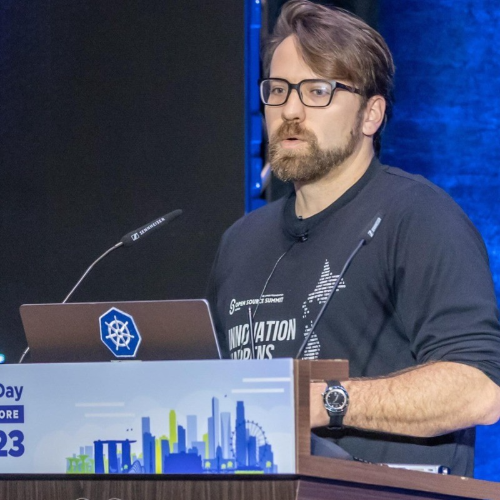
There are lots of Operators for Kubernetes out there. But how many have you built that are designed for scale across many clusters and regions, in a Platform Engineering context?In this short workshop we'll interact with and build operators that work across multiple clusters and regions, using an IAM abstraction pattern developed at Thoughtworks that is designed to work not only across regions but...
In today's fast-paced world, resilience is crucial for success. Tricia Broderick, co-author of "Lead Without Blame" and a leadership advisor, defines workplace resilience as the human ability to meet and recover from adversity and setbacks. Resilience is vital for navigating uncertainty, yet many people overlook the importance of intentionally building it. Join Tricia to explore four key aspects t...
Development is experiencing a new phase of automation, similar to what we saw with DevOps. Numerous new tools are emerging, and it can be challenging to keep up with them. These tools are leading to new practices, and understanding the principles and patterns of these practices will help you navigate the space of AI Native Development....
Platform teams have the privilege of being scalers by default. Everything we do touches the life of hundreds if not thousands of engineers. So... how do we make sure we're changing things for the better?In this talk we'll go over what it means to be an engineer in a platform team and how to properly evaluate the work we do to make sure we're always delivering our best. All of this, coming from the...
Fire in production and not knowing which component was at fault?Leaking layers?It takes forever for the application page to load, but it used to be super fast at the beginning?Don't worry - these are very common problems. Many factors lead to them and my role here is to help you tackle them. You might ask how? I'm already rushing to answer - using an evolutionary approach to your software architec...
“The definition of insanity is doing the same thing over and over again” - this quote attributed to Einstein warns us of the danger of magical thinking, hoping that trying something just one more time will achieve success when before we failed. But is this really insanity?In this talk, I’ll argue that retrying things actually does make a lot of sense, and is in fact key to improving the resilience...
There are significant changes happening in distributed systems. Object storage is becoming the database, tools for transactional processing and analytical processing are becoming one in the same, and there are new programming models that promise some combination of superior security, portability, management of application state, or simplification. These changes will influence how systems are opera...
A common saying by software architects is “that’s an implementation detail”. All too often we treat software architecture and implementation as two separate things, where implementation is something that happens once a software architecture is defined. In fact, it’s the other way around: software architecture should be viewed as a first draft, where implementation reveals more details and refineme...
Since the release of ChatGPT, teachers across the world have struggled to adapt to AI’s impact on education. Similarly, engineers have had to reckon with how these tools are changing software. At Instructure, we’re at the center of both waves. In this session, we’ll review what is happening with AI in education, how we’ve adjusted our development practice to accommodate it, and you’ll learn what y...
In this talk, I will share the lessons in testing strategy I learned so you don’t have to.Testing is not merely a technical task; it's a strategic imperative that can make or break a project. From product inception to product launch, testing plays a critical role in shaping success. In this talk, we'll delve into how testing should be integrated throughout the product lifecycle as a strategic tool...
Computers are getting better and better in answers, yet we as humans still ask better questions. we also understand better how to manipulate the machine. yet the machines rise to their greatest part in human history to help solve the ultimate challenge of all times: Code trust. Let’s dive together into a comprehensive example-packed session with technological, economical, philosophical and more as...
I've been using a technique called Event Storming in lots of different contexts. I use it to model legacy systems, to design new systems, to understand various convoluted business processes, primarily as an exercise in building shared understanding. I've also been coaching others and learning some surprising things about organisations.This session is a gentle introduction to Event Storming, some t...

BrokerChooser, a leading broker comparison website, relies on Google-driven traffic for business growth. In this session, we will explore how AI solutions enhance our scalability, focusing on two key use cases: data collection and translation. We will discuss the business impact of these AI-driven initiatives, the challenges faced, and key learnings from implementing them....
Essentials* is Craft's new track for developers who want to grow strong foundations. Whether you're just starting out or filling key gaps, these inspiring talks from top speakers will help you level up and love the journey.Whether you are writing an instance method, a classic procedural-style function or a purer side-effect free function and whether your programming language or architecture calls ...
Essentials* is Craft's new track for developers who want to grow strong foundations. Whether you're just starting out or filling key gaps, these inspiring talks from top speakers will help you level up and love the journey.Software is complicated. Machine learning, microservice architectures, message queues… every few months there’s another revolutionary idea to consider, another framework to lear...
Essentials* is Craft's new track for developers who want to grow strong foundations. Whether you're just starting out or filling key gaps, these inspiring talks from top speakers will help you level up and love the journey.We will discuss the absolute bare-bones essential version of Test-Driven Development. Folks complain TDD doesn't work, then describe a process that's not TDD. I don't mind criti...
Essentials* is Craft's new track for developers who want to grow strong foundations. Whether you're just starting out or filling key gaps, these inspiring talks from top speakers will help you level up and love the journey.Improvement begins with a commitment to learning, but collaborative learning isn’t always straightforward. Retrospectives offer a valuable opportunity to reflect on past experie...
With the aid of maps, a wander through the history of technology development - what it means, where we are going and what should we learn from the past. From cloud to AI, from architecture to software engineering....

The most expensive programming activity is not producing code. It’s trying to make sense of it to decide what to do next. This is particularly visible in a legacy environment. The problem is not the amount of time we spend figuring systems out. The problem is how we spend that time.In this talk we introduce and exemplify a way of programming that optimizes how we read our systems through contextua...
In a world where users expect lightning-fast, interactive web experiences, Astro offers a fresh, optimized approach to modern web development. This talk introduces you to Astro, a framework designed to deliver blazing performance by blending static-site generation with selective, "islands of interactivity" that keep only the interactive parts of your site dynamic.Learn how Astro enables seamless u...
After a decade, the industry is realizing that poorly designed microservices can easily transform into a distributed monolith, even more problematic than the spaghetti monolith they aimed to address. To tackle this issue, the concept of a modular monolith is emerging as an alternative approach.However, the challenge still lies in effectively splitting it without falling into the pitfall of a tight...
This talk is an experience report from numerous transformations towards the ideas of Team Topologies. Over the last years I have helped several organizations to work with Team Topologies. The activities were very diverse. Often it was about the identification of suitable team boundaries and the establishment of different Team Topologies such as Stream-aligned, Enabling, Complex Subsystem or Platfo...
Pretty much everybody understands when and why you should “choose boring technology,” in Dan McKinley’s memorable phrase. But when it comes to building engineering orgs, too many of us keep chasing the same small slice of “top engineering talent” and relying on them to move the business forward. I actually think we have this exactly backward.It's a huge competitive advantage if you can build an en...
This talk explores how artificial intelligence is reshaping the landscape of engineering leadership. As AI transforms our technical workflows, engineering managers face both new opportunities and profound challenges in team development.We'll examine how AI enhances managerial capabilities while potentially altering the skill acquisition journey for engineering teams. Discover practical application...
While we still don’t yet know all the best practices for building applications with generative AI, we do know many practices that don’t work. This talk first discusses how building with foundation models differs from traditional ML, and where it stands with product and full-stack engineering. It then discusses different anti-patterns throughout the developmental cycle....
For a long time, I wondered how to test Next.js applications that talk to HTTP APIs (e.g., microservices) more effectively. How can I test the whole application in isolation without mocking the requests to the microservices? I was at a loss until I discovered Contract Testing with Specmatic.In this talk, I'll share what I found out. After the talk, you'll know:Why mocking network requests is probl...
Generative AI is reshaping the software development lifecycle (SDLC), driving unprecedented improvements in developer productivity, quality, and speed. Yet, quantifying the return on investment (ROI) remains a critical challenge for enterprise leaders seeking tangible results.In this session, Bruno Passos, Group Product Manager & GenAI Innovation Lead at Booking.com, shares practical insights and ...
All the Vibes – Productivity, Chaos, and the New FrontierAs AI tools begin to write, refactor, review code, generate UI mockups, and even draft product specs, the boundaries of how we build software are rapidly shifting. What does this mean for the way teams build products? What new skills, risks, and opportunities are emerging? Join us for a candid, end-of-conference conversation exploring how AI...

From Buzzword to Backbone: Integrating Machine Learning into our SDLC. Machine learning isn’t just a nice-to-have anymore—it’s becoming a core part of the software development lifecycle (SDLC) at most tech companies. But getting there isn’t easy. In this talk, I’ll share the journey, challenges, and key learnings from embedding over 20 ML models into production. From insurance quoting and pricing ...
Essentials* is Craft's new track for developers who want to grow strong foundations. Whether you're just starting out or filling key gaps, these inspiring talks from top speakers will help you level up and love the journey.Many developers are familiar with concepts like clean architecture, hexagonal design, and microservices, but few have the opportunity to see what these principles look like in a...


In large organizations, documentation often becomes outdated, fragmented, and difficult to navigate, creating challenges for both knowledge owners and consumers.This talk explores how generative AI can transform documentation from a static burden into a dynamic and conversational experience. We'll share our journey, moving from traditional workflows to AI-powered solutions, with a focus on user ex...

As AI systems become foundational infrastructure, developers must adapt to building with components that are probabilistic, emergent, and often opaque. This talk distills practical lessons from deploying agentic architectures and benchmarking LLM capabilities, focusing on how to test, debug, and reason about non-deterministic behavior. We’ll explore infrastructural patterns, effective evaluation s...


Tier 1 suppliers such as Continental has been the backbone of the automotive industry for decades. To remain profitable, they must excel in innovation, at winning projects, delivering the right product in time, and staying within budget.This talk will delve into ADAS software projects, exploring the natural phases of these projects and the organizational patterns observed at each stage. We will di...

The short answer for the title is of course: different. This would be a very short talk otherwise. The experience of 10+ LLM based application development projects were distilled into this talk. It mainly focuses on differences compared to other kinds of projects and advice on what to expect to change when moving from proof-of-concept to production. As we have seen multiple times this shift requir...

This session delves into the architectural blueprint of AI agents, emphasizing the critical elements of agent logic, toolbox selection and environment integration. Together we explore how to leverage real-time context usage to enhance agent decision-making and response generation. Learn how to build intelligent systems that adapt and thrive in dynamic environments, driving efficiency and innovatio...
The question of diversity is of ever-growing importance. The cardinal question is, how do you integrate it into your professional life?Whether you are a team leader or just beginning your career, this is a topic you would want to listen to!Some of our talking points will include:What diveristy means to you now?Leadership commitment: part of internalized values or on the surface?Feeling so lonely: ...
mcp (model context protocol) is a way to expose any kind of functionality to the world of ai agentswe start with a llm (large language model), then move to an agent (build on top of the AI SDK) and providing it with a tool to get the weather for a given locationwe build our own mcp server and let our agent use itwe take a look at agent frameworks like mastra to build ai apps in cursor and see how ...
The talk covers the challenges and strategies involved in handling tens of billions of records daily and during outages in a petabyte-scale cloud migration. It highlights the use of Databricks and Azure SQL Hyperscale, custom connectors for recovery, client-specific authentication, and performance optimization using clustered columnstore indexes. The presentation focuses on bold decisions and prac...

The presentation showcases the major artificial intelligence-based developments in the automotive industry, as well as the opportunities provided by the ZalaZone test track in Hungary....

As artificial intelligence transforms the software industry, the question on every developer’s mind is: “Will AI replace me?” This lecture challenges that narrative, revealing how AI is not a threat, but an unprecedented opportunity for growth, creativity, and productivity.Join us for an inspiring and technically rich exploration of how AI tools-from code generators to intelligent testing and docu...
THIS TALK CAN ONLY BE VISITED WITH THE TECH LEADERS PASSSecurity, compliance, and privacy are becoming critical concerns as AI adoption grows. In this candid roundtable, tech leaders share hands-on experiences navigating regulatory frameworks and real-world security implementation risks. What does it really take to lead AI securely in 2025?...
THIS TALK CAN ONLY BE VISITED WITH THE TECH LEADERS PASSAs budgets shrink and ambitions grow, engineering leaders face increasing pressure to deliver more with less. But what truly drives organizational efficiency today? In this roundtable, we’ll explore different angles — from measuring engineering productivity to rethinking team structures and strategic priorities. Expect a candid, hands-on disc...
“If someone is taking a journey, he (or she) can tell a story. Therefore I would take my staff and hat and would choose to travel.” (Matthias Claudius, 1740-1815)The present talk was designed with exactly this, 1000-times heard (and slightly updated), German proverb in the back of the head. Initially created for a student audience („From education to employment: A requirements-set for modern softw...
Designing Modular Systems poses the critical challenge of determining which services should be deployed together in the same process and which should be deployed separately.Sometimes, you want to maintain a modular development approach, like in microservices, while opting for a monolithic deployment to optimize performance, reduce costs, or simplify infrastructure complexity.There are also cases w...






